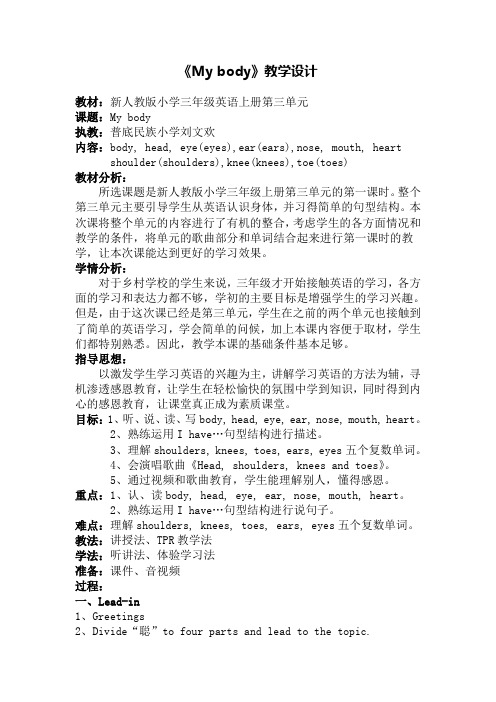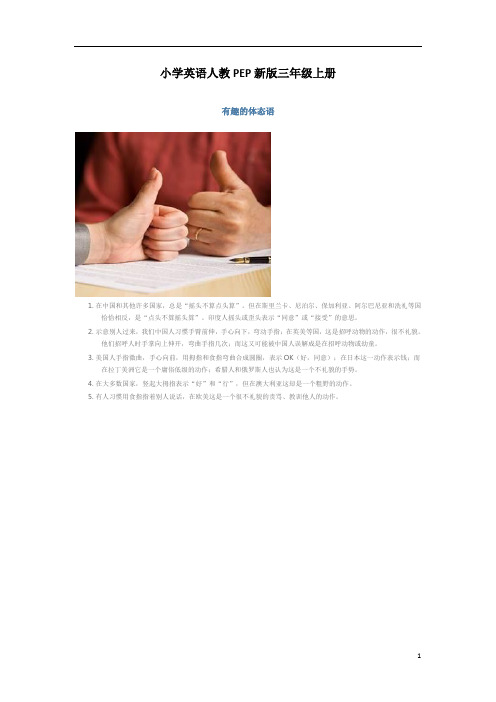2018-2019年英语人教PEP版小学三年级上册人体部位和习语 一
- 格式:doc
- 大小:35.00 KB
- 文档页数:5

小学英语人教PEP新版三年级上册人体部位和英语习语(二)1. StomachThe stomach is naturally related to one's appetite. If you dislike heavy food, you have no stomach for it (反胃). The word is also related to one's interests or likings. If you find something boring or vulgar, you have no stomach for it, either. Bad food turns your stomach. Similarly, your stomach turns at a bad joke.Stomach can also be a verb. Look at this example: "How could you stomach (忍受) such rude words?"Apparently, stomach here can be replaced by "tolerate".2. ArmEvery person has two arms: the right arm and the left arm. The right arm is usually stronger, so we call a good helper the right arm (得力助手).We all know an arm is not very long. But when you keep someone at arm's length (保持距离), the distance is long enough. For that means you do not like that person and you try your best to avoid him or her. We should indeed keep the bad friends at arm's length.3. HandQuite a number of phrases formed form the word hand are very similar to their Chinese counterparts. Here are some obvious examples: a fresh hand (新手), short of hands (人手短缺), hand in hand (手拉手) and wash one's hands of something (洗手不干了). But do not always take this for granted. Study these examples and you will understand.He lives from hand to mouth (He has just enough money to live on). We gave them a big hand (We gave them lots of applause.).4. FingerHow many fingers does each of your hands have? Now let's name them in English from the smallest: the little finger, the ring finger, the middle finger, the index finger and thumb.Each finger has its own part to play. If your fingers are all thumbs (笨拙), that is too bad. That means you are very clumsy.5. ThumbChinese people turn up their thumbs to express appreciation. English peopled so to express not only appreciation but also approval. Chinese people never turn their thumbs down to mean anything. But English people do. They do so to show depreciation or disapproval. Thus in English you can say, "We turn thumbs up (赞成) to Jack's suggestion but they turn thumbs down (不赞成) to it." Similarly, you can warmly praise someone by saying "Thumbs up (真棒)!" and show your dissatisfaction by saying "Thumbs down (差劲)!"6. NailIf you see two of your classmates fighting tooth and nail (又抓又咬), you must stop them atonce. Otherwise, at least one of them would be hurt.Nail also means a thin pointed piece of metal for hammering into something.But it is related to the body in this sentence: "Peter is as hard as nails (结实的像铁打的)."We all hope that we are as strong and healthy as he is.Then if I say you have hit the nail on the head (中肯,一针见血), I do not mean that you have done something cruel. I mean that you have said exactly the right thing.7. LegThe word leg appears in many colloquial expressions. At a party, when you feel like dancing, you can say to a good friend of yours, "Let's shake a leg." Obviously, it means "Let's dance." When you want your fiend to hurry, you can also "shake a leg". In American English it means "hurry".The arms and legs are very important to us. Therefore when asked why you are not going to buy something expensive, you may answer, "It costs an arm and a leg!" You mean that it is really expensive. If you pull one's leg, it means you make fun of someone.8. ToeTo convey the idea "from head to foot", English people can say from top to toe. But Chinese people don't.Some people turn their toes out (八字脚) when they walk. Some turn their toes in.When faced with danger, we must be alert and ready for action, that is to say, we must be on our toes (保持警惕).9. SkinHuman beings have skin. So have animals and plants. The skin can be thick or thin. A think-skinned person, or a person who has a thin skin, is easily upset or offended while a thick-skinned person, or a person who has a thick skin, is quite the contrary. Both expressions are sometimes derogatory (贬义).That is to say, sometimes the former refers to a person who is too sensitive; the latter a person who has little sense of shame.10. HairMost people will only think of the hair on our head when the word hair is mentioned. In fact, some animals and plants also have hair.A horrible scene may make a person's hair stand on end (毛骨悚然). But a courageous person will not turn a hair (不畏惧) even though he is in face of danger.Sometimes, a friend of yours may be so angry that he may act foolishly. Then you had better give him this advice: "Keep your hair on (别发脾气)".。


《My body》教学设计教材:新人教版小学三年级英语上册第三单元课题:My body执教:普底民族小学刘文欢内容:body, head, eye(eyes),ear(ears),nose, mouth, heart shoulder(shoulders),knee(knees),toe(toes)教材分析:所选课题是新人教版小学三年级上册第三单元的第一课时。
整个第三单元主要引导学生从英语认识身体,并习得简单的句型结构。
本次课将整个单元的内容进行了有机的整合,考虑学生的各方面情况和教学的条件,将单元的歌曲部分和单词结合起来进行第一课时的教学,让本次课能达到更好的学习效果。
学情分析:对于乡村学校的学生来说,三年级才开始接触英语的学习,各方面的学习和表达力都不够,学初的主要目标是增强学生的学习兴趣。
但是,由于这次课已经是第三单元,学生在之前的两个单元也接触到了简单的英语学习,学会简单的问候,加上本课内容便于取材,学生们都特别熟悉。
因此,教学本课的基础条件基本足够。
指导思想:以激发学生学习英语的兴趣为主,讲解学习英语的方法为辅,寻机渗透感恩教育,让学生在轻松愉快的氛围中学到知识,同时得到内心的感恩教育,让课堂真正成为素质课堂。
目标:1、听、说、读、写body, head, eye, ear, nose, mouth, heart。
2、熟练运用I have…句型结构进行描述。
3、理解shoulders, knees, toes, ears, eyes五个复数单词。
4、会演唱歌曲《Head, shoulders, knees and toes》。
5、通过视频和歌曲教育,学生能理解别人,懂得感恩。
重点:1、认、读body, head, eye, ear, nose, mouth, heart。
2、熟练运用I have…句型结构进行说句子。
难点:理解shoulders, knees, toes, ears, eyes五个复数单词。

小学英语人教PEP新版三年级上册
有趣的体态语
1. 在中国和其他许多国家,总是“摇头不算点头算”。
但在斯里兰卡、尼泊尔、保加利亚、阿尔巴尼亚和洗礼等国
恰恰相反,是“点头不算摇头算”。
印度人摇头或歪头表示“同意”或“接受”的意思。
2. 示意别人过来,我们中国人习惯手臂前伸,手心向下,弯动手指;在英美等国,这是招呼动物的动作,很不礼貌。
他们招呼人时手掌向上伸开,弯曲手指几次;而这又可能被中国人误解成是在招呼动物或幼童。
3. 美国人手指微曲,手心向前,用拇指和食指弯曲合成圆圈,表示OK(好,同意);在日本这一动作表示钱;而
在拉丁美洲它是一个庸俗低级的动作;希腊人和俄罗斯人也认为这是一个不礼貌的手势。
4. 在大多数国家,竖起大拇指表示“好”和“行”,但在澳大利亚这却是一个粗野的动作。
5. 有人习惯用食指指着别人说话,在欧美这是一个很不礼貌的责骂、教训他人的动作。
1。
人体部位和英语习语(一)1. HeadThe head is thought to be the most important part of the human body. So a leader is often compared to a head (首脑). Thus we have Head of State or the head of a delegation.The head is where the brain is located. It is naturally associated with ideas and intelligence. Very often, we need other people's ideas and opinions when we want to do something well. This is because two heads are better than one (三个臭皮匠顶个诸葛亮).2. EyeThe eyes are extremely precious to us. That is why we say "Mind your eye (当心)!" when we reminding someone to be careful.Not only human beings and animals have eyes, many things also have "eyes"—the eyes of a ship, the eye of a needle, the eye of a typhoon, and so on.3. EarThe ear is the organ of hearing. A piece of light music is easy on the ear (悦耳动听). We are usually all ears (专心聆听) for news.When they think somebody is overhearing, English people useeither of the two proverbs: Walls have ears (隔墙有耳) and Pitchers have ears (壶罐有耳). They also think that little pitchers have big ears (小孩子耳朵尖). Nice boys and girls respect other people. They will not secretly listen to others' private conversations.4. NoseThe English phrase "face to face (面对面)" and its Chinese counterpart (对应) are exactly the same. But English people, to express the same idea, can say nose to nose instead. There is no such substitute in Chinese.The word nose appears in many idioms. Here are two which are quite similar to their Chinese equivalents: Lead somebody by the nose (牵着某人的鼻子走) and turn up one's nose at somebody or something (对某人或某物嗤之以鼻).English people can say as plain as the nose in one's face (一清二楚) to mean "very obvious". Maybe to them, the nose is the most conspicuous part of the face.5. LipWe have two lips: the upper lip and the lower lip. If one's two lips are closed, one cannot speak. So it goes without saying that "don't open your lips(不要开口)" means " don't speak".His lips are sealed. Are his lips really stuck together bywax or glue? No, his lips are sealed when asked about something that he must keep secret. Sometimes a top secret is betrayed because it has escaped someone's lips (脱口而出). Then the incident may become a piece of news that is on everybody's lips (众口相传).6. TongueWe all know we cannot speak without the tongue. So the tongue is closely related to speech. To hold one's tongue (保持沉默) means "to keep silent". A person who has too much tongue (太多嘴) is disliked by all, for he is too talkative. Mother tongue is not the tongue of a mother: it is a person's native language."Don't you have a mouth below your nose (你鼻子底下不是有张嘴吗)?" The Chinese say so to blame a person who did not say what he should have said. But this is not the right way to express the idea in English. English people would say, “You have a tongue in your head, haven't you?”7. FaceFace has to do with the idea of respect and dignity both in Chinese and English. You lose your face (丢面子) if you fail again and again, but a decisive victory will save your face (挽回面子) after all your failures.When you feel unhappy, you pull a long face (拉长脸). Theidea is conveyed in Chinese in the same way. But "about face (向后转)" does not refer to the face. It is a military order to turn round and face in the opposite direction. It is the exact equivalent of "about turn".8. ShoulderThe shoulders can bear heavy things. Your father has a great responsibility for the family on his shoulder. When faced with difficulty, the family should stand shoulder to shoulder (肩并肩) to overcome it. You should not turn a cold shoulder (不理睬) to your family members. Nor should you give your friends the cold shoulder (冷落朋友). Both expressions mean treating others coldly.9. Back.A good host is hospitable to his guests. But, if guest is tiresome, the host is glad to see his back (他离开).If your friend has done something really well, you may give him a pat on the back (轻轻拍背部) to show your appreciation.If you turn your back on somebody (不理睬他人), you mean you do not like making friends with that person.10. HeartThe heart is an extremely important organ inside the chest. It usually stands for something important or the centre ofsomething, for example, the heart of the matter (问题的核心) or the heart of mystery.Many other expressions make use of the word heart. A lover can be called a sweet heart (情人). The Purple Heart (紫心徽章) is a medal given as an honor to American soldiers wounded in battle.If your friend is in trouble, you may encourage him by saying "Don't lose heart (不要灰心)."。